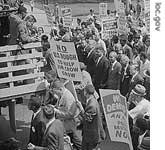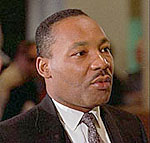VOA慢速英语 2007 0419b
时间:2019-01-11 作者:英语课 分类:VOA慢速英语2007年(四)月
VOICE ONE:
This is Richard Rael.
VOICE TWO:
And this is Rich Kleinfeldt with THE MAKING OF A NATION -- a VOA Special English program about the history of the United States.
(MUSIC)
Today, we tell about the movement for civil rights for black Americans.
(MUSIC)
VOICE ONE:

August 28, 1963: March on Washington
The day is August twenty-eighth, nineteen sixty-three. More than two hundred fifty-thousand people are gathered in Washington. Black and white, young and old, they demand equal treatment for black Americans. The nation's most famous civil rights leader, Martin Luther King, is speaking.
MARTIN LUTHER KING: "I am happy to join with you today in what will go down in history as the greatest demonstration 1 of freedom in the history of our nation. "
VOICE TWO:
Early in its history, black Africans were brought to America as slaves. They were bought and sold, like animals. By the time of America's Civil War in the eighteen sixties, many had been freed by their owners. Many, however, still worked as slaves on the big farms of the South. By the end of the war, slavery had been declared unconstitutional. But that was only the first step in the struggle for equality.
VOICE ONE:
Most people of color could not get good jobs. They could not get good housing. They had far less chance of a good education than white Americans. For about one hundred years, blacks made slow gains. Widespread activism for civil rights did not really begin until after World War Two. During the war, black Americans earned respect as members of the armed forces. When they came home, many demanded that their civil rights be respected, too. An organization, the National Association for the Advancement 2 of Colored People, led the way.
VOICE TWO:
In nineteen fifty-one, the organization sent its lawyers to help a man in the city of Topeka, Kansas. The man, Oliver Brown, and twelve others had brought legal action against the city. They wanted to end racial separation in their children's schools. At that time, two of every five public schools in America had all white students or all black students. The law said all public schools must be equal, but they were not. Schools for white children were almost always better than schools for black children. The situation was worst in Southern states.
VOICE ONE:
The case against the city of Topeka -- Brown versus 3 the Board of Education -- was finally settled by the nation's highest court. In nineteen fifty-four, the Supreme 4 Court ruled that separate schools for black children were not equal to schools for white children. The next year, it said public schools must accept children of all races as quickly as possible.
VOICE TWO:
In September nineteen fifty-seven, a black girl tried to enter an all-white school in the city of Little Rock, Arkansas. An angry crowd screamed at her. State guards blocked her way. The guards had been sent by the state governor, Orville Faubus. After three weeks, a federal court ordered Governor Faubus to remove the guards. The girl, Elizabeth Eckford, and seven other black students were able to enter the school. After one day, however, riots 5 forced the black students to leave.
VOICE ONE:
President Dwight Eisenhower ordered federal troops to Little Rock. They helped black students get into the white school safely. However, angry white citizens closed all the city's public schools. The schools stayed closed for two years.
In nineteen sixty-two, a black student named James Meredith tried to attend the University of Mississippi. School officials refused. John Kennedy, the president at that time, sent federal law officers to help him. James Meredith became the first black person to graduate from the University of Mississippi.
VOICE TWO:

Rosa Parks is fingerprinted after her arrest in Montgomery, Alabama
In addition to fighting for equal treatment in education, black Americans fought for equal treatment in housing and transportation. In many cities of the South, blacks were forced to sit in the back of buses. In nineteen fifty-five, a black woman named Rosa Parks got on a bus in the city of Montgomery, Alabama. She sat in the back. The bus became crowded. There were no more seats for white people. So, the bus driver ordered Missus Parks to stand and give her seat to a white person. She refused. Her feet were tired after a long day at work. Rosa Parks was arrested.
VOICE ONE:

Martin Luther King Jr.
The Reverend Martin Luther King organized the black citizens of Montgomery. They were the major users of the bus system. They agreed to stop using the buses. The boycott 7 lasted a little more than a year. It seriously affected 8 the earnings 9 of the bus company. In the end, racial separation on the buses in Montgomery was declared illegal. Rosa Parks's tired feet had helped win black Americans another victory in their struggle for equal rights. And, the victory had been won without violence.
VOICE TWO:
The Reverend King was following the teachings of Indian spiritual leader, Mohandas Gandhi. Gandhi urged his followers 10 to reach their political goals without violence. One of the major tools of nonviolence in the civil rights struggle in America was the "sit-in". In a sit-in, protesters entered a store or public eating place. They quietly asked to be served. Sometimes, they were arrested. Sometimes, they remained until the business closed. But they were not served. Some went hours without food or water.
VOICE ONE:
Another kind of protest was the "freedom ride." This involved buses that traveled through states from the North to the South. On freedom rides, blacks and whites sat together to make it difficult for officials to enforce racial separation laws on the buses. Many freedom rides -- and much violence -- took place in the summer of nineteen sixty-four. Sometimes, the freedom riders were arrested. Sometimes, angry crowds of whites beat the freedom riders.
VOICE TWO:
Perhaps the most dangerous part of the civil rights movement was the campaign to win voting rights for black Americans. The Fifteenth Amendment 11 to the Constitution said a citizen could not be denied the right to vote because of race or color. Several Southern states, however, passed laws to try to deny voting rights to blacks for other reasons.
VOICE ONE:
Martin Luther King and his supporters demonstrated to demand new legislation 12 to guarantee the right to vote. They held protests in the state of Alabama. In the city of Birmingham, the chief law officer ordered his men to fight the protesters with high-pressure water hoses 13 and fierce dogs. People throughout the country watched the demonstration on television. The sight of children being beaten by policemen and bitten by dogs awakened 14 many citizens to the civil rights struggle. Federal negotiators reached a compromise. The compromise was, in fact, a victory for the protesters. They promised to stop their demonstrations 15. In exchange, they would be permitted to vote.
VOICE TWO:
President Johnson signed a major civil rights bill in nineteen sixty-four. Yet violence continued in some places. Three civil rights workers were murdered in Mississippi. One was murdered in Alabama. Martin Luther King kept working toward the goal of equal rights. He died working. On April fourth, nineteen sixty-eight, he was shot to death in Memphis, Tennessee. He had gone there to support a strike by waste collection workers. A white man, James Earl Ray, was tried and found guilty of the crime.
VOICE ONE:
A wave of unrest followed the murder of Martin Luther King. Blacks in more than one hundred cities in America rioted 16. In some cities, areas affected by the riots were not rebuilt for many years. The movement for civil rights for black Americans continued. But it became increasingly violent. The struggle produced angry, bitter memories. Yet it also produced some of the greatest words spoken in American history.
MARTIN LUTHER KING: "When we allow freedom to ring, when we let it ring from every village and every hamlet, from every state and every city, we will be able to speed up that day when all of God's children -- black men and white men, Jews and Gentiles, Protestants and Catholics -- will be able to join hands and sing in the words of the old Negro spiritual: 'Free at last! Free at last! Thank God almighty 17, we are free at last!'"
(MUSIC)
VOICE TWO:
This program of THE MAKING OF A NATION was written by Jeri Watson and produced by Paul Thompson. This is Rich Kleinfeldt.
VOICE ONE:
And this is Richard Rael. Join us again next week for another VOA Special English program about the history of the United States.
- His new book is a demonstration of his patriotism.他写的新书是他的爱国精神的证明。
- He gave a demonstration of the new technique then and there.他当场表演了这种新的操作方法。
- His new contribution to the advancement of physiology was well appreciated.他对生理学发展的新贡献获得高度赞赏。
- The aim of a university should be the advancement of learning.大学的目标应是促进学术。
- The big match tonight is England versus Spain.今晚的大赛是英格兰对西班牙。
- The most exciting game was Harvard versus Yale.最富紧张刺激的球赛是哈佛队对耶鲁队。
- It was the supreme moment in his life.那是他一生中最重要的时刻。
- He handed up the indictment to the supreme court.他把起诉书送交最高法院。
- The criminal was fingerprinted in the sheriff's office. 罪犯在警长办公室里被取下指纹。 来自辞典例句
- They were then taken to be photographed and fingerprinted. 然后,他们被带去照相、留指纹。 来自互联网
- We put the production under a boycott.我们联合抵制该商品。
- The boycott lasts a year until the Victoria board permitsreturn.这个抗争持续了一年直到维多利亚教育局妥协为止。
- She showed an affected interest in our subject.她假装对我们的课题感到兴趣。
- His manners are affected.他的态度不自然。
- That old man lives on the earnings of his daughter.那个老人靠他女儿的收入维持生活。
- Last year there was a 20% decrease in his earnings.去年他的收入减少了20%。
- the followers of Mahatma Gandhi 圣雄甘地的拥护者
- The reformer soon gathered a band of followers round him. 改革者很快就获得一群追随者支持他。
- The amendment was rejected by 207 voters to 143.这项修正案以207票对143票被否决。
- The Opposition has tabled an amendment to the bill.反对党已经就该议案提交了一项修正条款。
- They began to draft legislation.他们开始起草法规。
- The liberals band together against the new legislation.自由党员联合一致反对新的立法。
- The fireman trained their hoses on the burning building. 消防队员把水龙带对准燃烧的建筑物。 来自《简明英汉词典》
- Are there any fire hoses in the building? 在这幢大楼里有消防水管吗? 来自《简明英汉词典》
- She awakened to the sound of birds singing. 她醒来听到鸟的叫声。
- The public has been awakened to the full horror of the situation. 公众完全意识到了这一状况的可怕程度。 来自《简明英汉词典》
- Lectures will be interspersed with practical demonstrations. 讲课中将不时插入实际示范。
- The new military government has banned strikes and demonstrations. 新的军人政府禁止罢工和示威活动。
- These people rolled in wealth and rioted in debauchery. 这些人钱财很多,过着荒淫的生活。
- The discontented crowd rioted. 不满的群众暴动起来。